英语中六大从句用法总结42341
英语从句类型总结
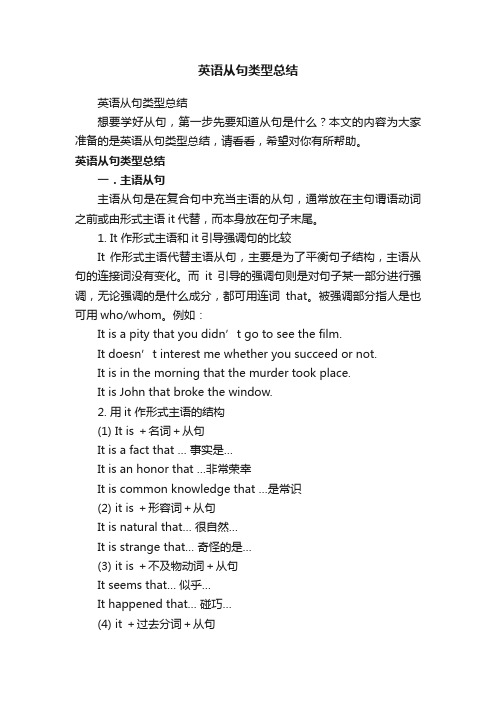
英语从句类型总结英语从句类型总结想要学好从句,第一步先要知道从句是什么?本文的内容为大家准备的是英语从句类型总结,请看看,希望对你有所帮助。
英语从句类型总结一.主语从句主语从句是在复合句中充当主语的从句,通常放在主句谓语动词之前或由形式主语it代替,而本身放在句子末尾。
1. It 作形式主语和it引导强调句的比较It 作形式主语代替主语从句,主要是为了平衡句子结构,主语从句的连接词没有变化。
而it引导的强调句则是对句子某一部分进行强调,无论强调的是什么成分,都可用连词that。
被强调部分指人是也可用who/whom。
例如:It is a pity that you didn’t go to see the film.It doesn’t interest me whether you succeed or not.It is in the morning that the murder took place.It is John that broke the window.2. 用it 作形式主语的结构(1) It is +名词+从句It is a fact that … 事实是…It is an honor that …非常荣幸It is common knowledge that …是常识(2) it is +形容词+从句It is natural that… 很自然…It is strange that… 奇怪的是…(3) it is +不及物动词+从句It seems that… 似乎…It happened that… 碰巧…(4) it +过去分词+从句It is reported that… 据报道…It has been proved that… 已证实…3. 主语从句不可位于句首的五种情况(1) if 引导的主语从句不可居于复合句句首。
(2) It is said , (reported) …结构中的主语从句不可提前。
英语从句用法小结
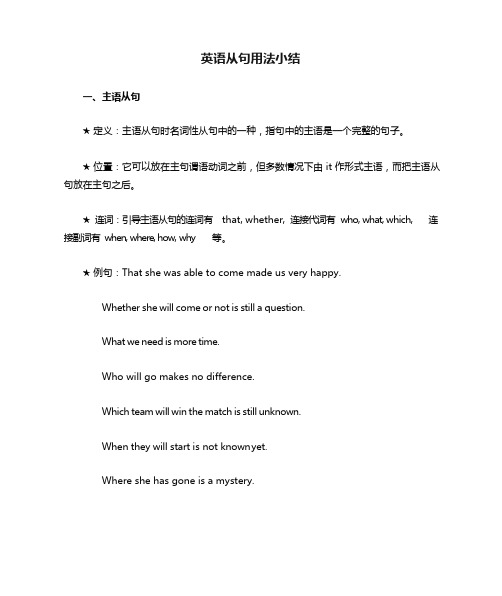
英语从句用法小结一、主语从句★ 定义:主语从句时名词性从句中的一种,指句中的主语是一个完整的句子。
★ 位置:它可以放在主句谓语动词之前,但多数情况下由 it 作形式主语,而把主语从句放在主句之后。
★连词:引导主语从句的连词有that, whether, 连接代词有who, what, which, 连接副词有 when, where, how, why 等。
★ 例句:That she was able to come made us very happy.Whether she will come or not is still a question.What we need is more time.Who will go makes no difference.Which team will win the match is still unknown.When they will start is not known y et.Where she has gone is a mystery.How this happened is not clear.Why he did that wasn ’t.★ 引导主语从句的 that 不作成分,但不能省略。
★ 由 it 作形式主语,常用句型有:It is + 名词/形容词/过去分词+主语从句It is still a question whether she will come or not. It is strange that you should like him.It is still unknown which team will win the match. 此外,还有以下常用结构:It turned out that … 结果是…It has been found that …已经发现…It has been p roved that …已经证明…It happened/occurred that …恰好…It is well-known that …据说…It is said/reported that …据说/据报道…It must be pointed o ut that …必须指出…It doesn ’t matter whether …是否…都没关系It makes no d ifference whether …是否…毫无区别二、表语从句★ 定义:表语是一个完整的句子。
英语中六大从句用法总结汇编
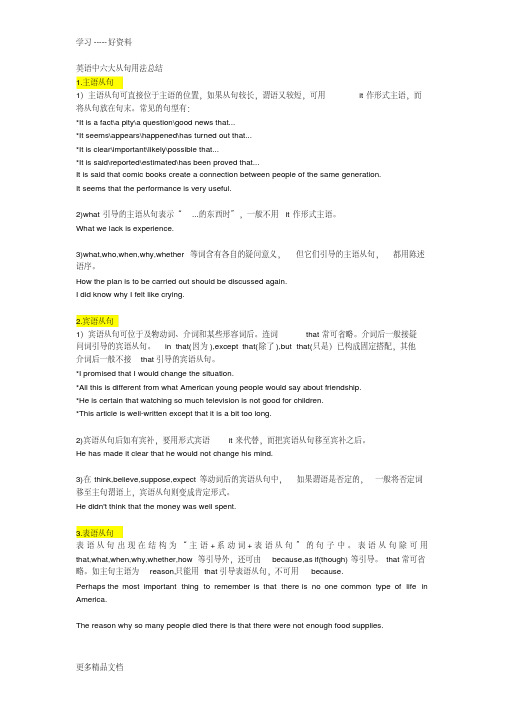
英语中六大从句用法总结1.主语从句1)主语从句可直接位于主语的位置,如果从句较长,谓语又较短,可用it作形式主语,而将从句放在句末。
常见的句型有:*It is a fact\a pity\a question\good news that...*It seems\appears\happened\has turned out that...*It is clear\important\likely\possible that...*It is said\reported\estimated\has been proved that...It is said that comic books create a connection between people of the same generation.It seems that the performance is very useful.2)what引导的主语从句表示“...的东西时”,一般不用it作形式主语。
What we lack is experience.3)what,who,when,why,whether等词含有各自的疑问意义,但它们引导的主语从句,都用陈述语序。
How the plan is to be carried out should be discussed again.I did know why I felt like crying.2.宾语从句1)宾语从句可位于及物动词、介词和某些形容词后。
连词that常可省略。
介词后一般接疑问词引导的宾语从句。
in that(因为),except that(除了),but that(只是)已构成固定搭配,其他介词后一般不接that引导的宾语从句。
*I promised that I would change the situation.*All this is different from what American young people would say about friendship.*He is certain that watching so much television is not good for children.*This article is well-written except that it is a bit too long.2)宾语从句后如有宾补,要用形式宾语it来代替,而把宾语从句移至宾补之后。
从句的用法归纳总结
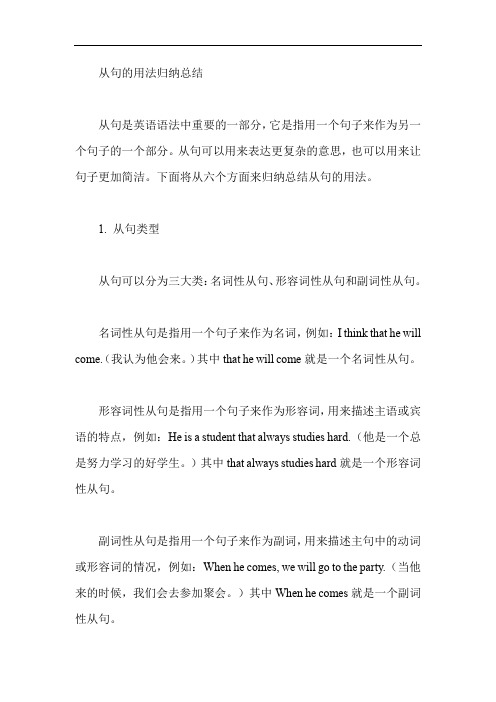
从句的用法归纳总结从句是英语语法中重要的一部分,它是指用一个句子来作为另一个句子的一个部分。
从句可以用来表达更复杂的意思,也可以用来让句子更加简洁。
下面将从六个方面来归纳总结从句的用法。
1. 从句类型从句可以分为三大类:名词性从句、形容词性从句和副词性从句。
名词性从句是指用一个句子来作为名词,例如:I think that he will come.(我认为他会来。
)其中that he will come就是一个名词性从句。
形容词性从句是指用一个句子来作为形容词,用来描述主语或宾语的特点,例如:He is a student that always studies hard.(他是一个总是努力学习的好学生。
)其中that always studies hard就是一个形容词性从句。
副词性从句是指用一个句子来作为副词,用来描述主句中的动词或形容词的情况,例如:When he comes, we will go to the party.(当他来的时候,我们会去参加聚会。
)其中When he comes就是一个副词性从句。
2. 从句引导词从句的引导词有很多种,不同的引导词可以引导不同类型的从句。
常用的引导词有:* that:可以引导名词性从句和形容词性从句,但是不能引导副词性从句;* what:可以引导名词性从句;* who:可以引导名词性从句和副词性从句;* whom:可以引导名词性从句;* which:可以引导名词性从句;* where:可以引导副词性从句;* when:可以引导副词性从句;* why:可以引导名词性从句;* how:可以引导名词性从句和副词性从句。
3. 从句语序在英语中,主句和从句的语序一般是不同的。
主句通常采用陈述语序,而从句则可以采用疑问语序或倒装语序。
例如:Do you know where he lives?(你知道他住在哪里吗?)其中where he lives就是一个名词性从句,采用了疑问语序。
从句归纳总结

从句归纳总结在英语语法中,从句是一种包含一个主语和一个谓语的句子,可以用作复合句的一部分。
从句可以分为主从句和名从句两种类型。
主从句是指在复合句中充当主句或从句的一部分,而名从句是指充当名词的一部分。
本文将对主从句和名从句进行归纳总结。
一、主从句主从句是复合句的一种常见结构,由一个主句和一个或多个从句组成。
主从句之间有明确的层次关系,从句在语法上依赖于主句。
下面是一些常见的主从句类型:1. 定语从句:用来修饰名词或代词的从句,通常由关系代词(如who, whom, whose, which, that)引导。
例如:The book that I bought yesterday is very interesting.(我昨天买的那本书很有趣。
)The person who is standing over there is my brother.(站在那边的人是我的哥哥。
)2. 名词从句:用来充当名词的从句,通常由连接词(如that, whether, if, who, what)引导。
例如:I don't know what he is talking about.(我不知道他在说什么。
)She asked me if I could help her.(她问我是否能帮她。
)3. 时间从句:用来表示时间的从句,通常由引导词(如when, while, before, after)引导。
例如:I will call you when I arrive at the airport.(我到机场时会给你打电话。
)She was reading a book while she waited for the bus.(她在等公共汽车时看书。
)4. 原因从句:用来表示原因的从句,通常由引导词(如because, since, as, for)引导。
例如:He didn't go to the party because he was sick.(他因为生病所以没去参加聚会。
英语从句用法小结

英语从句从句有主语从句、表语从句、宾语从句、同位语从句、定语从句和状语从句6类。
前四类由于主语从句、表语从句、宾语从句及同位语从句在句子的功用相当于名词,所以通称名词性从句;后两类定语从句和状语从句功用相当于形容词,称为形容词性从句。
状语从句还可以分为条件状语从句、原因状语从句、方位状语从句和时间状语从句。
1.主语从句(Subject Clause):用作主语的从句叫主语从句。
引导主语从句的关联词有从属连词、疑问代词、疑问副词、缩合连接代词、缩合连接副词等。
2.表语从句(Predicative Clause):用作表语的从句叫表语从句。
引导表语从句的关联词与引导主语从句的关联词大都一样。
3.宾语从句(Object Clause):在句子中起宾语作用的从句叫做宾语从句.宾语从句分为动词的宾语从句,介词的宾语从句和形容词的宾语从句。
一、主语从句★定义:主语从句时名词性从句中的一种,指句中的主语是一个完整的句子。
★位置:它可以放在主句谓语动词之前,但多数情况下由it作形式主语,而把主语从句放在主句之后。
★连词:引导主语从句的连词有that, whether, 连接代词有who, what, which, 连接副词有when, where, how, why等。
★例句:That she was able to come made us very happy.Whether she will come or not is still a question.What we need is more time.Who will go makes no difference.Which team will win the match is still unknown.When they will start is not known yet.Where she has gone is a mystery.How this happened is not clear.Why he did that wasn’t.★引导主语从句的that不作成分,但不能省略。
从句的种类和用法详解

从句的种类和用法详解从句是英语语法中重要的一个部分,由一个主句和一个或多个从句组成。
从句可以增加语言的表达力,使句子更加丰富多样。
本文将详细解释从句的种类和用法,帮助读者更好地理解和运用从句。
一、名词性从句名词性从句在句子中充当名词的功能,可以作主语、宾语、表语或补语。
常见的名词性从句有三种种类:主语从句、宾语从句和表语从句。
1. 主语从句主语从句在句子中充当主语的角色,常以"that"引导。
例如:"That he is late surprises me."(他迟到了让我感到惊讶。
)2. 宾语从句宾语从句在句子中充当动词的宾语,通常由"that"引导,但在口语中可以省略。
例如:"I believe that he will come." (我相信他会来。
)"I know he will come." (我知道他会来。
)3. 表语从句表语从句在句子中充当表语的角色。
例如:"The important thing is that you try your best."(最重要的是你尽力而为。
)二、定语从句定语从句用来修饰名词或代词,常以关系代词或关系副词引导。
定语从句通常紧跟在被修饰的名词或代词之后。
例如:"The man who is speaking is my teacher."(正在说话的那个人是我的老师。
)"The book that I borrowed from the library is interesting."(我从图书馆借的那本书很有趣。
)三、状语从句状语从句用来表达时间、条件、原因、结果、目的、比较等信息,在句子中充当状语的角色。
根据不同的用途,状语从句可以分为六种类型。
1. 时间状语从句时间状语从句用来表示一个动作或事件发生的时间。
英语的从句类型与用法总结

英语的从句类型与用法总结
英语的从句类型与用法总结如下:
1.定语从句:在复合句中,修饰名词或代词的从句叫定语从句,被修饰的名词或代词叫先行词,引导定语从句的有关系代词(who, whom, whose, which, that 等)和关系副词(where, when, why等),关系代词和关系副词在定语从句中担任句子成分。
2.状语从句:由从句担任的状语,在句子中可修饰谓语(或其它动词)、形容词、副词或是整个句子,它可以用来表示时间、地点、原因、目的、结果、条件、方式、比较、让步等。
3.名词性从句:在句子中起名词作用的句子叫名词从句(Noun Clauses)。
名词从句的功能相当于名词词组,它在复合句中能担任主语、宾语、表语、同位语、介词宾语等,因此根据它在句中不同的语法功能,名词从句又可分别称为主语从句、宾语从句、表语从句和同位语从句。
英语中总共有六大从句,区分方法

精心整理英语中总共有六大从句,区分方法,用法,及例子如下:1.主语从句1)主语从句可直接位于主语的位置,如果从句较长,谓语又较短,可用it作形式主语,而将从句放在句末.常见的句型有:,都用2.宾语从句1)宾语从句可位于及物动词、介词和某些形容词后.连词that常可省略.介词后一般接疑问词引导的宾语从句.inthat(因为),exceptthat(除了),butthat(只是)已构成固定搭配,其他介词后一般不接that引导的宾语从句.*IpromisedthatIwouldchangethesituation.*AllthisisdifferentfromwhatAmericanyoungpeoplewouldsayaboutfriendship.*Heiscertainthatwatchingsomuchtelevisionisnotgoodforchildren.*Thisarticleiswell-writtenexceptthatitisabittoolong.2)宾语从句后如有宾补,要用形式宾语it来代替,而把宾语从句移至宾补之后. Hehasmadeitclearthathewouldnotchangehismind.3)在3.常可省略4.fact,idea,belief,news,hope,conclusion,evidence,suggestion,order,problem,report,decision.有时由于谓语较短,将同位语从句位于谓语之后. Shefinallymadethedecisionthatshewouldjointhefashionshow. IhadnoideahowmanybooksIcouldborrowatatime. Thenewscamethattheirteamhadwonthechampionship.5.定语从句定语从句所修饰的先行词可以是名词或代词,也可以是一个句子.定语从句通常位于先行词之后,由关系代词或关系副词引导.*限制性定语从句限制性定语从句修饰先行词,对先行词起修饰作用,紧接先行词之后,无逗号,若省去,原句等that,替代1)that引2)在从句中作宾语的关系代词常可省略.关系代词紧跟介词,作介词宾语时不可用that,只可用which或whom引导从句,并且不可省略,但当介词位于宾语从句句末时,作为介词宾语的关系代词仍可用that,也可省略. Thisisoneofthosethingswithwhichwehavetoputup.Thisisoneofthosethings(which\that)wehavetoputupwith.3)引导定语从句的关系副词有when,where,why等.关系副词在从句中作状语,意义上相当于一个“介词+which”的结构.Evenincomicbookswhere(=inwhich)therearenowords,thestoriesarefullyexpressedthroughth edrawings.Nooneknowsthereasonwhy(=forwhich)hewassoangrythatday.5.**““,该结*asas的名词.as引导非限制性定语从句时,代替整个主句,从句可位于主句之前、之后或中间. Thesearenotsuchproblemsascanbeeasilysolved.(as代替先行词problems) Asismentionedabove,nosinglecompanyorgroupcancontrolwhathappensontheInternet.(as代替主语)6.状语从句*时间状语从句引导时间状语从句的从属连词和词组有:1)when,whenever,while,as,after,before,since,till,until,once等. Wehavelearntquitealotaboutitsincewecamehere.2)assoonas,hardly(scarcely)...when,nosooner...than,each(every)time,themoment,immediate**1:2)3)引导目的状语从句的连词有:sothat,inorderthat,forfearthat,lest等,从句常使用may,might,can,could,would等情态动词. Wegotupearlythismorningsothatwecouldcatchthefirstbustotherailwaystation.*条件和让步状语从句1)引导条件状语从句的连词和词组有if,unless,as(so)longas,onconditionthat,incase,provided(providing)that,supposing等. Aslongasyouhavetherightequipment,youcanuseatelephonelinetotransmitcomputerdata. 2)引导让步状语从句的连词和词组有though,although,whether,eventhough,evenif,nomatterwhat(when,how...),whatever(whenev er,wherever,however.)等.though,evenif等引导状语从句可转换成含有as的部分倒装结构,*,。
各类从句讲解与例句

英语中六大从句用法总结1.主语从句1)主语从句可直接位于主语的位置,如果从句较长,谓语又较短,可用it作形式主语,而将从句放在句末。
常见的句型有:*It is a fact\a pity\a question\good news that...*It seems\appears\happened\has turned out that...*It is clear\important\likely\possible that...*It is said\reported\estimated\has been proved that...It is said that comic books create a connection between people of the same generation.It seems that the performance is very useful.2)what引导的主语从句表示“...的东西时”,一般不用it作形式主语。
What we lack is experience.3)what,who,when,why,whether等词含有各自的疑问意义,但它们引导的主语从句,都用陈述语序。
How the plan is to be carried out should be discussed again.I did know why I felt like crying.2.宾语从句1)宾语从句可位于及物动词、介词和某些形容词后。
连词that常可省略。
介词后一般接疑问词引导的宾语从句。
in that(因为),except that(除了),but that(只是)已构成固定搭配,其他介词后一般不接that引导的宾语从句。
*I promised that I would change the situation.*All this is different from what American young people would say about friendship.*He is certain that watching so much television is not good for children.*This article is well-written except that it is a bit too long.2)非谓语动词之后的宾语从句Reading that it was just a difference in custom, the foreigner smiled and said nothing. 这个外国人知道了这只是风俗的不同后,就笑了笑,没说什么。
高中英语中六大从句用法总结

高中英语中六大从句用法总结Summary: This article discusses the six major types of subordinate clauses in English。
including subject clauses and object clauses。
It provides examples and tips on how to use them correctly.1.Subject ClausesA XXX in the subject n。
If the clause is long and the predicate is short。
"it" can be used as a formal subject。
and the clause can be placed at the end of the sentence。
Common sentence structures include:It XXX。
It XXX。
It XXX。
It is said\XXX。
For example。
"It is said that comic books create a n een people of the same n." or "It seems that the performance is very useful."2.Object ClausesAn object clause XXX。
n。
or XXX "that" XXX word is usually used to introduce an object XXX such as "in that," "except that," and "but that" can also be used。
考研英语阅读之六大从句解析
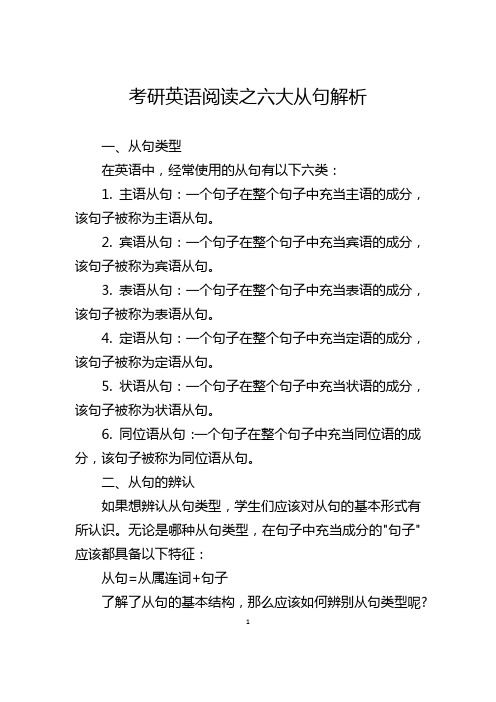
考研英语阅读之六大从句解析一、从句类型在英语中,经常使用的从句有以下六类:1. 主语从句:一个句子在整个句子中充当主语的成分,该句子被称为主语从句。
2. 宾语从句:一个句子在整个句子中充当宾语的成分,该句子被称为宾语从句。
3. 表语从句:一个句子在整个句子中充当表语的成分,该句子被称为表语从句。
4. 定语从句:一个句子在整个句子中充当定语的成分,该句子被称为定语从句。
5. 状语从句:一个句子在整个句子中充当状语的成分,该句子被称为状语从句。
6. 同位语从句:一个句子在整个句子中充当同位语的成分,该句子被称为同位语从句。
二、从句的辨认如果想辨认从句类型,学生们应该对从句的基本形式有所认识。
无论是哪种从句类型,在句子中充当成分的"句子"应该都具备以下特征:从句=从属连词+句子了解了从句的基本结构,那么应该如何辨别从句类型呢?1学生可以在句子中通过简单的公式进行辨认。
常见的从句出现形式有四类:1. 名词+从属连词+句子=定语从句/同位语从句2. 动词+从属连词+句子=宾语从句/表语从句3. ×+从属连词+句子=状语从句4. 从属连词+句子+动词=主语从句三、辨认方法和注意事项1. 名词+从属连词+句子=定语从句/同位语从句例子1:Yet, being friendly is a virtue that many Americans value highly and expect from both neighbors and strangers.(1997年Text2)从句类型:定语从句辨别方式:a virtue(名词)+that(从属连词)+many Americans value highly and expect from both neighbors and strangers(句子)译文:然而,表示友好是一种美德,美国人高度重视这种美德,并期望邻居和陌生人都能有这种美德。
英语六大从句

从句有主语从句、表语从句、宾语从句、同位语从句、定语从句和状语从句6类.前四类由于主语从句、表语从句、宾语从句及同位语从句在句子的功用相当于名词,所以通称名词性从句;后两类定语从句和状语从句功用相当于形容词,称为形容词性从句.状语从句还可以分为条件状语从句、原因状语从句、方位状语从句和时间状语从句.1.主语从句(Subject Clause):用作主语的从句叫主语从句.引导主语从句的关联词有从属连词、疑问代词、疑问副词、缩合连接代词、缩合连接副词等.2.表语从句 Predicative Clause):用作表语的从句叫表语从句.引导表语从句的关联词与引导主语从句的关联词大都一样.3.宾语从句(Object Clause):在句子中起宾语作用的从句叫做宾语从句.宾语从句分为三类:动词的宾语从句,介词的宾语从句和形容词的宾语从句.第一部分一.、定义:宾语从句就是一个句子作动词或介词的宾语.二、学习宾语从句要抓住三要素:连接词、语序和时态.连接词一般都是that(指事务或人),which 指事),who 指人)1.从句为陈述句,常选择连接词that或将that省略,直接与主句相连.2.从句为一般疑问句,常选择连接词if或whether.在whether…or not结构中不能用if替换. 3.从句为特殊疑问句,常选择what,when,where,which,who,how等的疑问代、副词作连接词.★当who为主语时,句式为:who+谓语+其他判断时态情况:1.主句是一般现在时,从句为各种时态情况2.主句是一般过去时,从句为各种相应过去时态注意:从句描绘客观事实,用一般现在时3.主句是一般将来时,一般从句为一般现在时 “主将从现”)例题:〈1. The teacher told the children that the sun__B__round.A. wasB. isC. wereD. are 答案为B,属于第二种情况.宾语从句,在复合句中作宾语,位于及物动词后;Tell him which class you are in .(1)主、从句时态一致:主句谓语过去时,从句相应过去时;He answered that he was listening to me.主句谓语现在时,从句时态任所需;He says (that) he will leave a message on my desk.具体过去永不变,真理格言现在时;He told me that he was born in 1980.2)否定前移,及完成反意问句;在think / believe / suppose / guess / imagine / expect等动词后跟宾语从句否定式时,应转移到主句上去,完成反意疑问句时,应与从句主、谓保持一致.(注: 否定前移的条件是,主句主语是第一人称)I don't think you are right ,are you ?3)在表示建议suggest , advise要求demand 、desire、require、request、propose;决定decide; 命令order、command; 坚决主张insist;等动词后跟宾语从句,用 should)+v. 虚拟语气)eg.I suggested that you should)study hard.4)如果宾语从句后有宾语补足语,用it作形式宾语,把宾语从句后置eg.You may think it strange that he would live there.5)宾语从句that常可省略,但在以下情况下不能省略A.当主句谓语动词带有两个或两个以上宾语从句时,可以省略第一个that,其他不能省略. eg.I believe that)you have done your best and that things will get bet?鄄ter.B.当it作形式宾语时eg.She made it clear that she had nothing to do with him.C.当宾语从句前置时eg.That our team will win,I believe.三、分类A 、作动词的宾语:eg.I heard the newsI 主语heard 谓语动词the news.名词作宾语I主语heard 谓语动词that he would come here later on.一个句子作宾语---宾语从句B 、作介词的宾语:eg.He said nothing about this plan .He主语said 谓语动词nothing 代词作动词的宾语about 介词the plan. 名词作介词的宾语四、带有宾语从句的复合句的构成:带有宾语从句的复合句就是用连接词把一个主句和一个宾语从句连接在一起.连接词有:that(可省略),what, who, when, where, why, which, if, whether, how.五、注意:A 宾语从句必须用陈述语序.False: He is wondering when can he finish this difficult job.Right: He is wondering when he can finish this difficult job.B 有时候可以用it 作形式宾语,而把真正的宾语从句放在后面.Bad: I thought that he could finish this job in just two hours impossible.Good: I thought it impossible that he could finish this job in just two hours.Bad: He left whether we should continue this project to my judgment.Good: He left it to my judgment whether we should continue this project.C 带有宾语从句的复合句的否定形式一般是否定主句.Bad: I think he doesn’t like the English teacher.Good: I don’t think he likes the English teacher.D False: He wanted to know why he is crying in the corner.Right: He wanted to know why he was crying in the corner.4.同位语从句(Appositive Clause):与先行词同位或等同的从句叫作同位语从句.其关联词多为that.5.定语从句 Attributive Clause):用作定语的从句叫定语从句.定语从句一般皆放在被它所修饰的名 代)词之后,这种名 代)词就叫作先行词 Antecedent).引导定语从句的关联词为关系代词(或称引导词、关系词等).关系代词在定语从句中可用作主语、宾语、定语等;关系副词在定语从句中用作状语.①引导定语从句的关联词有who, whom, whose, that, when, where, why 和which. 在非限制定语从句中, 只可用which, who, whose, where , when., 如果指代前面整个句子, 多用which.例句:The dog that/which was lost has been found. 失踪的狗已经找到了.)③as 可做引导词引导定语从句, 多和such, the same 连用. As 引导的定语从句也可修饰整个句子, 既可放在先行词后,也可放在句子开头.例句:Such people as you describe are rare nowadays. 你描述的那一类人现在很少了.)④介词+which/whom/whose从句The driver is the man from whose room she had stolen the gold watch. 她就是从那个司机的房间偷了金表的.)⑤代/名+介词+which 从句He is needing a book, the name of which I don't know.( 他需要一本书,但是我不知道书名.)⑥同位语从句和定语从句The news that you told me was really exciting. 你告诉我的好个消息真的是很激动人心.)⑦难句:NO.1He is one of the men who were chosen to represent the group. 他是被选为代表该团队的人中一员.)第二部分一、时态1·主句用一般现在时,从句可用任意时态.2·主句用过去时,从句用过去某个时态.3·主句用过去时,从句是真理时,只用一般现在时.二、宾语从句的几类连接词:①从属连词连接宾语从句的从属连词主要有that,if,whether. that引导表示陈述句的宾语从句,而if和whether引导表示“是否”的宾语从句.例句:I don’t know if there will be a bus any more.我不知道是否还会有公交车.②连接代词连接代词主要有who, whom ,whose ,what ,whoever ,whomever ,whosever, whatever, whichever等.连接代词一般指疑问,但what, whatever除了指疑问外,也可以指陈述.例句:Do you know who has won Red Alert game?你知道谁赢了这一局红警游戏吗?③连接副词连接副词主要有when,where,why,how,whenever,wherever,however等.例句:He didn’t tell me when we should meet again.他没有告诉我什么时候我们能再见面.三、动词的宾语从句大多数动词都可以带宾语从句We all expect that they will win , for members of their team are stronger.我们都预料他们会赢,因为他们的队员更强壮.★部分“动词+副词”结构也可以带宾语从句例句:I have found out that all the tickets for the concert have been sold out.我发现这场音乐会的所有票都卖光了.★动词短语也可以带宾语从句常见的这些词有:make sure确保make up one’s mind下决心keep in mind牢记例句:Make sure that there are no mistakes in your papers before you turn them in.在上交试卷前确保没有任何错误.四、可运用形式宾语it代替的宾语从句①动词find,feel,consider,make,believe等后面有宾语补足语的时候,则需要用it做形式宾语而将that宾语从句后置.例句:I think it necessary that we take plenty of hot water every day .我认为每天多喝开水是有必要的.②有些动词带宾语从句时寻要在宾语与从句前加it这类动词主要有:hate, take , owe, have, see to.例句:I hate it when they with their mouths full of food.我讨厌他们满嘴食物时说话.③若宾语从句是wh-类,则不可用it代替例句:We all consider what you said to be unbelievable.我们都认为你所说的是不可信的.五、介词的宾语从句用wh-类的介词宾语从句例句:We are talking about whether we admit students into our club.我们正在讨论是否让学生加入我们的俱乐部.★用that,if引导的介词宾语从句有时候except,but,besides三个介词后可见到that引导的宾语从句例句:I know nothing about my new neighbor except that he used to work with a company.对于我的新邻居我只知道他曾在一家公司上班,其他一无所知.六、形容词的宾语从句常用来引导宾语从句的形容词有:sure,certain,glad,please,happy,sorry,afraid,satisfied,surprised例句:I am sure I will pass the exam.我确信我会通过考试.七、if,whether在宾语从句中的区别①if和whether在作“是否”解时,引导宾语从句常放在动词know,ask,care,wonder,find out等之后,介词后一般不用if②少数动词,如:leave,put,discuss,doubt后的宾语从句常用whether.③whether后可以加or not,但是if不可以.④在不定式前只能用whether.如:I can’t decide whether to stay. 我不能决定是否留下.⑤避免歧异时,我们常用whether而不用if.八、哪些宾语从句不可以省略引导词that1.当that作learn,suggest,explain,agree,wonder,prove,mean,state,feel,hold等动词的宾语时;2.当宾语从句较长时;3.当主语状语置于主句尾,宾语从句之前时;4.当主语谓语动词(包括非谓语动词)与宾语从句之间有插入语时;5.当一个动词带有两个或两个以上宾语从句时,此时第一个that可以省略,第二个that不可以省略;6.当宾语从句中的主语是this,that或this,that做主语的定语时;7.当宾语从句是双宾语中的直接宾语时;8.当宾语从句的主语是非谓语动词或主语从句时;9.当主语中的谓语动词是固定词组时;10.当宾语从句有it做其先行词时;11.在直接引语中,转述分句把宾语从句隔开时.九、宾语从句的否定转移主句的谓语动词是think,believe,imagine,suppose,consider,espect,fancy,guess等,并且主句的主语是第一人称而且为一般现在时,从句的否定词一般要转移到主句上来,其反义疑问句一般与宾语从句一致.例句:I don’t think he will come to my party.而不能说成I think he won’t come to my party.我认为他不会来我的舞会.★如果宾语从句中有某个含有否定意义的形容词或副词,其反义疑问句要用肯定形式.例句:We find that he never listens to the teacher carefully,does he?我们发现他从来不仔细听老师讲课,是不是?十、宾语从句的时态和语序当主句为现在时或将来时的时候,宾语从句的时态一般不受主句的时态所影响.当主句为过去时的时,细分为一下几种情况:①从句用一般过去时或过去进行时表示与主句谓语动词动作同时发生例句:I only knew he was studying in a western country,but I didn’t know what country he was in.我只知道他当时在西方的一个国家读书,可不知道是哪个国家.②从句过去完成时表示该动作发生在主句谓语动作之前例句:He told me that he had told Mary about the meeting already.他告诉我他已经把有关会议的事情告诉的了Mary.③从句谓语用过去将来时表示该动作发生在主句谓语动作之后例句:The reporter asked if the government would take necessary measures to put down the to-do.记者问政府是否会采取必要的措施镇压骚乱.★如果从句是一个客观真理,那么从句的时候不根据主句的时态而变化例句:The teacher said that the moon goes around the earth yesterday.老师昨天说月亮绕着地球转.★当宾语从句的引导词是who,which,what,when,where,how,why等表疑问时,不能按正常语序安排,经常将这类引导词置于句首例句:Who do you think the public might choose as their favorite singer this year?你认为今年公众会选谁为他们最喜欢的歌手.同位语从句用法比较"固定",把关键的几个词背下来 下面这个材料供参考):一、在复合句中用作同位语的从句叫同位语从句.它一般跟在某些名词后面,用以说明该名词表示的具体内容.如:I had no idea that you were here.我不知道你在这里.二、可以跟同位语从句的名词通常有news,idea,fact,promise,question,doubt,thought,hope,message,suggestion,words消息),possibility等.如:I’ve come from Mr wang with a message that he won’t be able to see you this afternoon.我从王先生那里来,他让我告诉你他今天下午不能来看你了.三、英语中引导同位语从句的词通有连词that,whether,连接副词how,when,where等.( 注:if,which 不能引导同位语从句.)如:l have no idea When he will be back.我不知道他什么时候回来.四、有时同位语从句可以不紧跟在说明的名词后面,而被别的词隔开. 如:The thought came to him that maybe the enemy had fled the city.他突然想起可能敌人已经逃出城了.五、同位语从句与定语从句的区别.1、同位语从句与前面的名词是同位关系,即说明它前面名词的内容;而定语从句与前面的名词是修饰与被修饰关系,即限定它前面的名词范围,或补充一些情况.如:The news that l have passed the exam is true.我通过了考试这一消息是真的.同位语从句,即从句所表达的意思就是前面名词的内容.)The news that he told me just now is true.他刚才告诉我的消息是真的.定语从句,从句对前面名词起修饰限制作用,即“他告诉我的”那个消息,而不是别的消息.)2、引导同位语从句的that是连词,在从句中不充当任何成份,而引导定语从句的that是关系代词,除起连接作用外,还在从句中充当主语、宾语或表语等.如:The idea that computers can recognize human voices surprises many people.计算机能够识别人的声音的想法使许多人感到惊奇.that在从句中不充当任何成份.)一个名词(或其它形式)对另一个名词或代词进行修饰,限定或说明,这个名词(或其它形式)就是同位语.同位语与被它限定的词的格要一致,并常常紧挨在一起.1) 非独立的同位语:常出现在被限定词前Bruce Lee (姓名) 李小龙Graf Schmidt (称号,浑名) 施密特伯爵Doktor Wang (职称,头衔) 王博士Uncel Liu (亲戚的称呼) 刘叔叔die Stadt Shanghai (类属名称) 上海市the Province Hebei (类属名称) 河北省das Jahr 2000 (类属名称) 2000 年three Kilo tomato (度量名称) 三公斤西红柿the University Bremen (专有名词) 不来梅大学。
英语六大从句用法总结
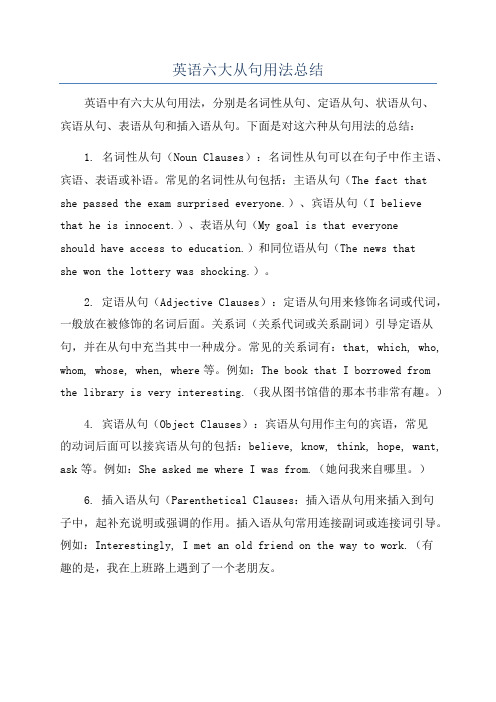
英语六大从句用法总结英语中有六大从句用法,分别是名词性从句、定语从句、状语从句、宾语从句、表语从句和插入语从句。
下面是对这六种从句用法的总结:1. 名词性从句(Noun Clauses):名词性从句可以在句子中作主语、宾语、表语或补语。
常见的名词性从句包括:主语从句(The fact that she passed the exam surprised everyone.)、宾语从句(I believe that he is innocent.)、表语从句(My goal is that everyoneshould have access to education.)和同位语从句(The news thatshe won the lottery was shocking.)。
2. 定语从句(Adjective Clauses):定语从句用来修饰名词或代词,一般放在被修饰的名词后面。
关系词(关系代词或关系副词)引导定语从句,并在从句中充当其中一种成分。
常见的关系词有:that, which, who, whom, whose, when, where等。
例如:The book that I borrowed from the library is very interesting.(我从图书馆借的那本书非常有趣。
)4. 宾语从句(Object Clauses):宾语从句用作主句的宾语,常见的动词后面可以接宾语从句的包括:believe, know, think, hope, want, ask等。
例如:She asked me where I was from.(她问我来自哪里。
)6. 插入语从句(Parenthetical Clauses:插入语从句用来插入到句子中,起补充说明或强调的作用。
插入语从句常用连接副词或连接词引导。
例如:Interestingly, I met an old friend on the way to work.(有趣的是,我在上班路上遇到了一个老朋友。
初高中六大从句的归纳整理

在句子中起名词作用的各种从句统称为名词性从句。
根据它们在句中的语法作用,这类从句又可分为主语从句、同位语从句、表语从句和宾语从句。
一完成以下选择题:1.【2012安徽】27. The limits of a person’s intelligence, generally speaking, are fixed at birth, but ________he reaches these limits will depend on his environment.A. whereB. whetherC. thatD. why2.【2012全国】24. It is by no means clear the president can do to end the strike.A. howB. whichC. thatD. what3.【2012山东】25. It doesn’t matter _____ you pay by cash or credit card in this store.A. howB. whetherC. whatD. why4.【2012湖南】26. Everyone in the village is very friendly. It doesn’t matter ___ you have lived there for a short or a long time.A. whyB. howC. whetherD. when5.【2012天津】9. It doesn’t matter ____ you turn right or left at the crossing—both roads lead to the park.A. whetherB. howC. ifD. when6.【2012江西】25. It suddenly occurred to him ___ he had left his keys in the office.A. whetherB. whereC. whichD. that2011-20021.【2011北京卷22】__________ Barbara Jones offers to her fans is honesty and happiness.A. WhichB. WhatC. ThatD. Whom 2.【2011江苏卷26】It was never clear _______ the man hadn’t reported the accident sooner.A. thatB. howC. whenD. why3.【2011重庆卷22】It is still under discussion __________the old bus station should be replaced with amodern hotel or not.A. whetherB. whenC. whichD. where 4.【2011湖南卷)31】Before a problem can be solved, it must be obvious ______the problem itself is.A. whatB. thatC. whichD. why5.〖10北京〗______ some people regard as a drawback is seen as a plus by many others.A. WhetherB. WhatC. ThatD. How6.〖10浙江〗It is uncertain ____ side effect the medicine will bring about, although about two thousandpatients have taken it.A. thatB. whatC. howD. whether7.〖09天津〗It is obvious to the students ______ they should get well prepared for their future.A. asB. whichC. whetherD. that8.〖08福建〗________ is known to us all is that the 2008 Olympic Games will take place in Beijing.A. ItB. WhatC. AsD. Which 9.〖08山东〗_________ was most important to her, she told me, was her family.A. ItB. ThisC. WhatD. As10.〖07全国Ⅱ〗________ matters most in learning English is enough practice.A. WhatB. WhyC. WhereD. Which11.〖07陕西〗____parents say and do has a life-long effect on their children.A. ThatB. WhichC. WhatD. As12〖07福建〗It is none of your business ______other people think about you. Believe yourself.A. howB. whatC. whichD. when 13.〖06天津〗What we used to think______ impossible now does seem possible.A. isB. wasC. has beenD. will be14.〖06山东〗___team wins on Saturday will go through to the national championships.A. No matter whatB. No matter whichC. WhateverD. Whichever15.〖06辽宁〗_____makes this shop different is that it offers more personal services.A. WhatB. WhoC. WhateverD. Whoever 16.〖03上海〗It is pretty well understood _____ controls the flow of carbon dioxide in and out the atmosphere today. A. that B. when C. what D. how17.〖03上海春〗_____ made the school proud was _____ more than 90% of the students had been admitted to key universities.A. What; becauseB. What; thatC. That; whatD. That’ because 18.〖02上海春〗_______fashion differs from country to country may reflect the cultural differences from one aspect. A. What B. That C . This D. Which二用适当的引导词填空。
英语各种从句的用法

英语中从句包括:名词从句、定语从句、同位语从句和状语从句.一、名词从句包括主语从句、宾语从句和表语从句.(一)主语从句考试重点:主语从句常用的连词的用法;it is desirable that引导的主语从句的用法.在句子中担当主语的是一个从句,这个从句就叫主语从句.主语从句可以由下列连词、连接代词和连接副词引导,且不能省略.连词:that,whether 连接代词:what,whatever,who,whoever等.连接副词:when,where,how,why1、由连词that,whether引导的主语从句.连词that,whether在主语从句中的作用只是引导主语从句,它在从句中不担任成分,不能省略,且由它们引导的主语从句,多用it做形式主语.(1)_____ was unimportant.A. Whether he enjoyed our dinner or notB. No matter how he enjoyed our dinnerC. If he enjoyed our dinnerD. What he enjoyed our dinner2)That the earth is round is true.(It is true that the earth is round.)地球是圆的,是个事实.2、由连接代词和连接副词引导的主语从句它们分别在从句中担任主语、宾语和状语,不能省略.注意翻译时不能把它们译为疑问句.由它们引导的主语从句,也可以用形式主语it引导.(1)Who let out the news remained unknown.(It remained unknown who let out the news.)谁泄露了那个消息仍旧无人知道.(2)When we’ll start is not clear.(It is not clear when we’ll start.)我们何时出发还不清楚.3、以连接代词what, whatever, whoever…引导的主语从句.What有时可以用来表示the thing which这种意思,引导从句,表示一样东西或一件事情.Who,whom,which,what,可以和ever构成合成词,和what一样引导从句,ever起强调作用.此类句子不能用形式主语it引导,它们在句子中担任成份,不能省略,语序为陈述句的语序.(1)_____ I saw was two men crossing the street.A. WhatB. WhomC. WhoD. That4、句型It is desirable (suggested, necessary, requested, ordered, proposed, urgent)+that+主语+should(可省略)+V(动词原形).(1)It’s urgent that a meeting _____ before the final decision is made.A. will be arrangedB. must be arrangedC. be arrangedD. would be arranged(二)表语从句考试重点:表语从句的基本用法;含有suggestion,proposal等词的表语从句的用法.1、在从句中做表语的从句叫表语从句.它位于主句中的系动词之后,常用的关联词和主语从句相同.(1)This is what he wants. 这就是他想要的东西.(2)The question is whether we can finish our work by tomorrow morning.问题是我们明天上午能否完成任务.2、用suggestion等词表示愿望、建议、命令等情绪时,用虚拟语气,从句中用should(可省略)+动词原形.(1)The general’s command was that the soldiers _____ their fort and carry out more important tasks.A. would leaveB. leaveC. leftD. have left(三)宾语从句考试重点:宾语从句用陈述句的语序;介词后面的宾语从句;suggest,insist,order,demand等动词后接宾语从句时,用虚拟语气;if和whether 的区别.1、宾语从句用陈述句的语序(1)Can you tell me _____ about the city that makes people love it so much?A. it is whatB. what it isC. what is itD. is it what2、介词后面的宾语从句(1)The people at the party were worried about Janet because no one was aware _____ she had gone.A. where thatB. of whereC. of the placeD. the place3、suggest,insist,order,demand等动词后作宾语时,表示欲望、建议、命令等时,用虚拟语气.①His mother insisted that he _____ the coat when going out.A. put onB. puts onC. to putD. putting on4、在下列情况下不能用if , 而用whether.后跟不定式:He didn’t tell me whether to go or stay. 他没有告诉我是走还是留下.前面有介词:He raised the question of whether we could find the necessary money.他提出我们能否筹集到必要的资金这个问题.引导主语从句:Whether they win or lose is all the same to me.他们胜利也好,失败也好,对我来说都是一样的.后面直接跟or not:I wonder whether I’ll catch the last bus or not.我不知道我能否赶上末班车.(四) 同位语从句常跟在fact,idea,news等名词的后面,通常用连词that引导.1、Would the news _____ he failed to pass the exam bother you?A. whichB. thatC. of whichD. on which2、I had no idea that you were here. 我没有想到你会在这里.如果同位语从句所修饰的先行词是suggestion,proposal等名词的时候,谓语动词用should+原形动词.should可以省略.1、My suggestion that we do the experiment again is accepted bythem.我的再做一次实验的建议被他们所接纳.2、His proposal that they(should)challenge the other groups to a friendly competition is praised by the teacher. 他提议他们和别的组挑战,来一场友谊竞赛.这个提议受到了老师的表扬.二、定语从句考试重点:限定性定语从句中关系代词的用法;关系副词when,where,why,引导的定语从句;带介词的定语从句;非限定性定语从句;“名词(代词)+介词+关系代词”引出,一般是非限定性定语从句.在复合句中起定语作用的从句叫做定语从句.定语从句分为两种:限定性定语从句和非限定性定语从句.注意关系代词和关系副词在从句中的应用.(一)关系代词who,whom,whose,which,that引导的定语从句1、The company official _____ I thought would be fired received a raise.A. whomB. whoeverC. whoD. of whom(二)关系副词when ,where, why, 引导的定语从句1、The time will come _____ man can fly to outer space freely.A. thatB. whenC. in thatD. which(三)关系代词前带介词的定语从句1、Before her marriage, she spent a considerable time in that very part of Shanghai, _____ she belonged.A. whichB. to whereC. to whichD. at which(四)非限定定语从句对被修饰的名词起附加说明,或进一步描述或补充.这种从句有一定的独立性,即使去掉,主句的意思仍然完整,只是内容相对地不够具体.与主句之间常用逗号分开,所用的关系代词与限定性定语从句基本相同,但不能用关系代词that 引导.(1)An Old friend from abroad, _____I was expecting to stay with, telephoned me from the airport.A. thatB. whomC. whoD. which (五)“名词(代词)+介词+关系代词”引出,一般是非限定性定语从句.We’ve tested three hundred types of boot, _____is completely water proof.A. no of whichB. none of whichC. some of whichD. neither of which 考试重点:同位语从句的基本用法;含有suggestion,proposal等词的同位语从句.三、状语从句在主从句中起状语作用的从句叫状语从句.常见的状语从句有时间、地点、条件、原因、让步、方式、比较、目的、结果.考试重点:状语从句的种类及一些连词的基本用法;让步状语从句;unless,supposed (that),whomever,whenever,wherever等连词的含义和用法.一)时间状语从句常用的连词有:when,whenever(无论什么时候),since,as,until,hardly…when,no sooner…than,as soon as,before,after,the moment,the minute(一…就…)1、No sooner had they got the goods covered up _____ it started raining hard.A. whenB. thanC. thenD. after二)条件状语从句常用if,unless(除非,如果不),as/so long as只要.1、_____ I’m mistaken, I’ve seen that man before.A. UnlessB. IfC. BecauseD. Provided三)、原因状语从句常用:because, as, since.如果表示必然的因果关系,一般用because引入;而since表示一种间接或附带的原因;用as 只是提一下.1、He cannot go to school because he is ill. 他因为生病不能上学.2、Everyone likes you as you are both kind and honest. 人人都喜欢你,因为你既和气,又诚实.四)让步状语从句常用though/although,as (尽管),even if/though,however,whatever,wherever,whoever,no matter how/what/who等.1、In short, _____ he lives, a man belongs to some society.A. whateverB. wheneverC. whicheverD. wherever2、_____, you must show your ticket to go into the cinema.A. No matter whoever you areB. Whomever you areC. Whoever you areD. No matter who are you五)方式状语从句常用as, just as, as if/though 等词.1、_____ was pointed above, this substance can be used as a substitute.A. ItB. ThatC. WhatD. As2、He talks as if he _____ everything in the world.A. knowsB. knewC. had knownD. would have known六)目的状语从句常用so that , in order that, lest (以免,以防), in case.1、I wrote it down _____ I should forget it.A. in caseB. in case ofC. in order thatD. for fear of2、I’ll give you my phone number, so that you can call me when you arrive here.我把我的电话号码告诉你,以便你到达这里后可以给我打电话.七)结果状语从句常用so…that, such…that They are _____ students that they all performed well in the nationwide examinations.专注于活动方案总结,小学初中高中试卷,可以编辑的文档,欢迎下载使用本文档来源网络,由于文档太多,审核有可能疏忽,如果有错误或侵权,请联系本店马上删除。
六大从句用法总结

定语从句 page7
状语从句
时间状语从句 引导时间状语从句的从属连词和词组有: 1)when,whenever,while,as,after,before,since,till,until,once等. *We have learnt quite a lot about it{ since we came here}. 2)as soon as,hardly(scarcely)...when,no sooner...than,each(every) time,the moment,immediately(that)等. *{As soon as I sent an e-mail message},I received positive responses. *{The moment he heard the good news},he jumped with joy.
定语从句 page1
定语从句
• 限制性定语从句 限制性定语从句修饰先行词,对先行词起修饰作用,紧接先行词之后, 无逗号,若省去,原句意思不完整. 引导定语从句的关系代词有who,whom,whose,which,that等. who,whom,whose用于指人,whose有时也可指物,相当于of which; which用于指物; that既可指人也可指物,但只用于限制性定语从句中.关系代词除了 引导定语从句,替代先行词外,还在从句中担任主语、宾语、定语等.
状语从句 page1
状语从句
地点状语从句 引导地点状语从句的连词是where,wherever. *{Wherever she went},she took her little daughter with her. 原因、结果和目的状语从句 1)引导原因状语从句的从属连词有:because,as,since,now(that),seeing that,considering that,in that等. {Considering that he is a freshman},we must say he is doing well. 2)引导结果状语从句的连词有:so...that,such...that ,so that,that,so等. Mickey Mouse is so attractive{ that the children are reluctant to leave}.
英语的从句类型与用法总结资料

英语的从句类型与用法总结资料英语的从句类型与用法总结资料1英语从句分类介绍从句体系包括:从句体系(从句系统)图示从句体系(从句系统)图示第一,名词性从句(主语从句、表语从句、宾语从句及同位语从句)第二,定语从句第三,状语从句分类从句不能单独成句,但它也有主语部分和谓语部分,是一个特殊句子,就像一个句子一样。
所不同在于,从句须由一个关联词引导。
根据从句语法功能的不同可分为:主语从句、表语从句、宾语从句、同位语从句、定语从句和状语从句6类。
前四类由于主语从句、表语从句、宾语从句及同位语从句在句子的功用相当于名词,所以通称名词性从句;定语从句功能相当于形容词,称为形容词性从句;而状语从句功能相当于副词,称为副词性从句。
状语从句还可以分为条件状语从句、原因状语从句、地点状语从句、目的状语从句、让步状语从句、比较状语从句、方式状语从句、结果状语从句和时间状语从句。
主语从句(Subject Clause)用作主语的从句叫主语从句。
引导主语从句的关联词有从属连词、疑问代词、疑问副词、缩合连接代词、缩合连接副词等。
表语从句(Predicative Clause)用作表语的从句叫做表语从句。
引导表语从句的关联词与引导主语从句的关联词很多都一样。
宾语从句(Object Clause)在句子中起宾语作用的从句叫做宾语从句.宾语从句分为三类:动词的宾语从句、介词的宾语从句和形容词的宾语从句。
同位语从句是名词性从句(主语从句、表语从句、宾语从句、同位语从句)中的主要从句之一,从句作同位语表示与之同位的名词(短语)的实际内容,它的作用相当于名词,对前面的名词(短语)加以补充说明或进一步解释,相当于一个表语从句,它们之间的关系就是同位关系,即主表关系。
定语从句是由关系代词或关系副词引导的从句,其作用是作定语修饰主句的某个名词性成分,相当于形容词,所以又称为形容词性从句,一般紧跟在它所修饰的先行词后面。
状语从句可分为:时间状语从句(adverbial clause of time)地点状语从句(adverbial clause of place)原因状语从句(adverbial clause of cause)条件状语从句(adverbial clause of condition)目的状语从句(adverbial clause of purpose)让步状语从句(adverbial clause of concession)比较状语从句(adverbial clause of comparison)方式状语从句(adverbial clause of manner)结果状语从句(adverbial clause of result)2英语八类状语从句的用法归纳一、概说状语从句即指在主从复合句用作状语的从句。
- 1、下载文档前请自行甄别文档内容的完整性,平台不提供额外的编辑、内容补充、找答案等附加服务。
- 2、"仅部分预览"的文档,不可在线预览部分如存在完整性等问题,可反馈申请退款(可完整预览的文档不适用该条件!)。
- 3、如文档侵犯您的权益,请联系客服反馈,我们会尽快为您处理(人工客服工作时间:9:00-18:30)。
英语中六大从句用法总结1.主语从句1)主语从句可直接位于主语的位置,如果从句较长,谓语又较短,可用it作形式主语,而将从句放在句末。
常见的句型有:*It is a fact\a pity\a question\good news that...*It seems\appears\happened\has turned out that...*It is clear\important\likely\possible that...*It is said\reported\estimated\has been proved that...It is said that comic books create a connection between people of the same generation.It seems that the performance is very useful.2)what引导的主语从句表示“...的东西时”,一般不用it作形式主语。
What we lack is experience.3)what,who,when,why,whether等词含有各自的疑问意义,但它们引导的主语从句,都用陈述语序。
How the plan is to be carried out should be discussed again.I did know why I felt like crying.2.宾语从句1)宾语从句可位于及物动词、介词和某些形容词后。
连词that常可省略。
介词后一般接疑问词引导的宾语从句。
in that(因为),except that(除了),but that(只是)已构成固定搭配,其他介词后一般不接that 引导的宾语从句。
*I promised that I would change the situation.*All this is different from what American young people would say about friendship.*He is certain that watching so much television is not good for children.*This article is well-written except that it is a bit too long.2)宾语从句后如有宾补,要用形式宾语it来代替,而把宾语从句移至宾补之后。
He has made it clear that he would not change his mind.3)在think,believe,suppose,expect等动词后的宾语从句中,如果谓语是否定的,一般将否定词移至主句谓语上,宾语从句则变成肯定形式。
He didn't think that the money was well spent.3.表语从句表语从句出现在结构为“主语+系动词+表语从句”的句子中。
表语从句除可用that,what,when,why,whether,how等引导外,还可由because,as if(though)等引导。
that常可省略。
如主句主语为reason,只能用that引导表语从句,不可用because.Perhaps the most important thing to remember is that there is no one common type of life in America. The reason why so many people died there is that there were not enough food supplies.It looks as if successful international cultural communication will make the world smaller.4.同位语从句同位语从句用于对前面出现的名词作进一步说明,一般用连词that引导,由于先行名词的意义不同,也可用whether,who,when,where,what,why,how等引导。
常见的先行名词有fact,idea,belief,news,hope,conclusion,evidence,suggestion,order,problem,report,decision.有时由于谓语较短,将同位语从句位于谓语之后。
She finally made the decision that she would join the fashion show.I had no idea how many books I could borrow at a time.The news came that their team had won the championship.5.定语从句定语从句所修饰的先行词可以是名词或代词,也可以是一个句子。
定语从句通常位于先行词之后,由关系代词或关系副词引导。
*限制性定语从句限制性定语从句修饰先行词,对先行词起修饰作用,紧接先行词之后,无逗号,若省去,原句意思不完整。
引导定语从句的关系代词有who,whom,whose,which,that等。
who,whom,whose用于指人,whose有时也可指物,相当于of which;which用于指物;that既可指人也可指物,但只用于限制性定语从句中。
关系代词除了引导定语从句,替代先行词外,还在从句中担任主语、宾语、定语等。
The computers and cables which make up the Internet are owned by people and organizations.Those who live alone or who are sick may have trouble in getting close to other people.The girl whose parents died in an accident is living with her grandmother.1)当先行词是all,anything,everything,something,nothing等不定代词或先行词前有first,last,any,few,much,some,no,only以及形容词最高级修饰时,只能用关系代词that引导从句。
That is all that I've heard from him.He's the first person that I'm going to interview this afternoon.2)关系代词的省略在从句中作宾语的关系代词常可省略。
关系代词紧跟介词,作介词宾语时不可用that,只可用which或whom引导从句,并且不可省略,但当介词位于宾语从句句末时,作为介词宾语的关系代词仍可用that,也可省略。
This is one of those things with which we have to put up.This is one of those things (which\that) we have to put up with.3)引导定语从句的关系副词有when,where,why等。
关系副词在从句中作状语,意义上相当于一个“介词+which”的结构。
Even in comic books where(=in which) there are no words,the stories are fully expressed through the drawings.No one knows the reason why(=for which) he was so angry that day.5.定语从句*非限制性定语从句非限制性定语从句既可修饰先行词,也可修饰整个主句,起补充说明作用,与主句之间有逗号隔开,若省去,原句意思不受影响。
不可用that引导非限制性定语从句。
关系词不可省略。
Every object has a gravitational pull,which is rather like magnetism.*“介词+which\whom\whose”引导的定语从句“介词+which\whom\whose”可引导限制性定语从句,也可引导非限制性定语从句,该结构中介词的选择取决于从句谓语动词的固定搭配,或先行词的习惯搭配。
This is the computer on which he spent all his savingsIt is written by a person with whom we are all familiar.*as引导的定语从句as引导的定语从句主要用于“such...as”及“the same...as”的结构中,代替先行词是人或物的名词。
as 引导非限制性定语从句时,代替整个主句,从句可位于主句之前、之后或中间。
These are not such problems as can be easily solved.(as代替先行词problems)As is mentioned above,no single company or group can control what happens on the Internet.(as 代替主语)6.状语从句*时间状语从句引导时间状语从句的从属连词和词组有:1)when,whenever,while,as,after,before,since,till,until,once等。
We have learnt quite a lot about it since we came here.2)as soon as,hardly(scarcely)...when,no sooner...than,each(every) time,themoment,immediately(that)等。
As soon as I sent an e-mail message,I received positive responses.The moment he heard the good news,he jumped with joy.*地点状语从句引导地点状语从句的连词是where,wherever.Wherever she went,she took her little daughter with her.*原因、结果和目的状语从句1)引导原因状语从句的从属连词有:because,as,since,now(that),seeing that,considering that,in that等。
